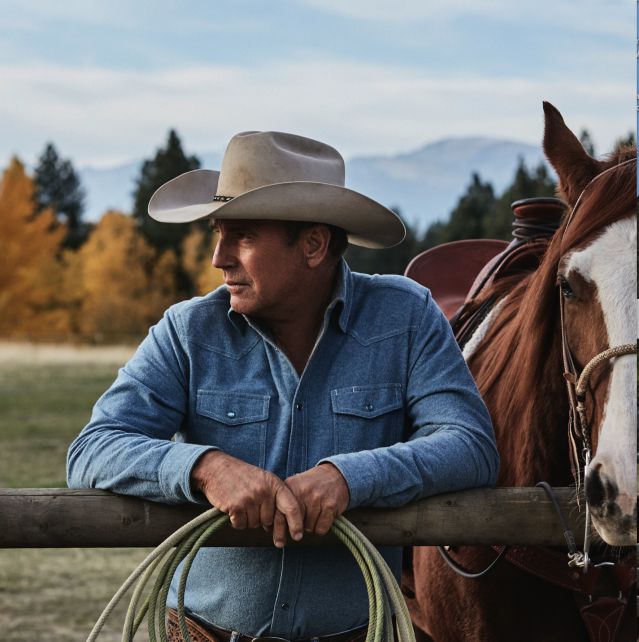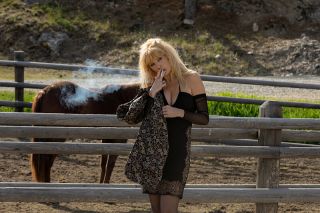Cognitive Dissonance
Yellowstone: An Analysis of a Very Popular Show
How its messaging short-circuits cognitive dissonance in some of us.
Posted December 22, 2022 Reviewed by Lybi Ma
Key points
- Yellowstone is the most popular drama series in the U.S. but with the least diverse viewership.
- The show's messaging strives to avoid cognitive dissonance by glossing over its departures from reality and history in favor of nostalgia.
- Analysis of the show's tropes demonstrates how toxic masculinity and revisionist history are lifted up each week.

Yellowstone is the most popular American TV series with the consistently least diverse viewership (Horton, 2022). What could be more American, and populist, than a show about a white male patriarch rancher, John Dutton (Kevin Costner), leading his family (and all Montanans, as their governor) to aggressively beat back the threats posed by coastal elites, environmentalists (those terrible folks), and big city tourists? Yellowstone serves up a host of tropes designed for ready consumption by its audience. Show creator Taylor Sheridan crafts messaging to short-circuit the cognitive dissonance audience members might experience if they started to notice how often the show’s events and philosophy depart from reality and history and fail to acknowledge the real-world consequences of breaking the law. Here are a few of the show’s tropes and themes.
Patriarchy and toxic masculinity aren’t dead because women can do it even better.
John Dutton’s daughter, Beth (Kelly Reilly), is clearly a polarizing character when one reads the comments on websites discussing the show. She’s a sharp, sexy "badass" who cracked the patriarchal code when she was 17 and barhopped successfully with no I.D. She knows that you can use the sexist objectification of women as a weapon: “You can be its victim or you can use it to your advantage.” She is more tough, vicious, and physically aggressive than nearly anyone (read: man) in the Yellowstone universe, and proves it with regularity. I suppose her violence is meant to be a fresh take, or more acceptable because it’s being perpetrated by a woman.
Growing up a rich man’s daughter, Beth never learned self-control. The contradictory messaging on this point is so stark I sometimes wonder if the writers are as crazy as Beth is written. In one episode, John Dutton tells his daughter, “Impulse control. Find some.” In the very next episode, John Dutton washes his hands of a situation where Beth beats John’s girlfriend, Summer, to a bloody pulp. The grand patriarch is notably absent from this scene, though he knows it’s happening and is just inside the house at the time. Wouldn’t patriarchy demand that he keep Beth in line and protect his lover from her predictable violence? No, because Beth is such a toxically masculine subject on this show, so pure in her wielding of violence and instant payback, that everybody else is a mere pretender to the throne.
Summer, a cartoonish caricature of those rude, know-it-all feminist, vegetarian elites, “has it coming” for being rude and lecturing about the evils of raising animals for meat at the dinner table. No vegetarian I know (and I do know several) ever speaks that way, especially at a dinner table where you are a guest. Because manners; and Montanans are not the only folks who have those. Also, if Summer has "9 years of jujitsu" under her belt, why does she keep getting hit in the face? In the following episode, the aftermath of their brutal punching fest is barely evidenced on Beth’s face, other than a slight discoloration under her left eye, while Summer’s face is cut and bruised and looks like it might start bleeding again any second. Summer’s face wrecked by Beth’s violence is a toxically masculine (and proto-fascist) subject’s wet dream, so much so that it’s served up to viewers on multiple episodes.
And talk about being a bad parent (and boyfriend). John Dutton's last word on her daughter's beat down of his girlfriend is that he "envies" Beth. That’s problematic because it idealizes and reasserts an outdated, dangerous idea that conflict should be resolved through violence.
Narcissism is a key characteristic of the protagonists.

Beth’s egocentrism and arrogance are captured in the opening of the sixth episode of Season 5, as she mansplains better than any man: “It’s a woman’s job to give a man perspective.” John Dutton has just tried to share his enjoyment of a majestic mountain vista, but Beth rains on her father's parade, saying, “It’s the same view as the one from the porch, just a different angle.” The deeper we peer into the abyss of Beth’s psyche, the more disturbing it gets. She tells her husband, “I did not find this beautiful. [When] I have it all to myself, that I understand. I don’t share the things I find beautiful.” That is, for something to be beautiful, she alone must possess it, and she doesn't share. In Beth’s case, the “perspective” she provides isn't broader, more inclusive, or edifying. It's pure selfishness and malignantly narcissistic. But this kind of individualism on steroids continues to be a staple of the show, and why would Sheridan tinker with a formula that brought in another 12.5 million viewers on its November 2022 premiere?
The poison apple doesn’t fall far from the poison tree. John Dutton, upon attaining the state’s highest office, and delivering several rousing and politically effective speeches, makes it plain in the limousine to Beth and his adopted son, Jamie, the state’s attorney: “Everything I do as governor will be done for the ranch.” Nothing but self-interest exists. No empathy, no service, no community. It's all for himself. Further, the showcased protagonists know where all the bodies are buried, because they killed them all and buried them there. We are witnesses to psychopathy at its very worst. Personally, I cannot root for folks with no capacity for empathy but plenty of finesse when it comes to branding, murdering, and betraying people. Yes, they mark all the hands at the ranch with a burning hot "Y" brand. This smacks of a cult, and of modern day slavery, not a loving family.
We’re gonna party like it’s 1959 (or 1859).
Nostalgia reigns supreme in Yellowstone. “This ranch hasn’t changed in a hundred years, or a thousand years,” says an indigenous woman and former history lecturer at the university who used to know better but somehow doesn’t now in Season 5 because of the lazy writing. The history and function of the land, say, 200 years ago, was certainly different before the first Dutton arrived, because the indigenous people lived there and had quite a different relationship with the land. But that’s erased in the show’s discourse, and the fictitious, nostalgic, whitewashed version of history is delivered to viewers by the indigenous woman, giving it an illusion of legitimacy when, in fact, it has none. The claim that the land hasn't changed in a millennium is a howler of a false claim and represents another form of violence that pulls a more critical consumer right out of the story.
Why watch?
It's a little like checking one’s feed on Twitter: It might be scary, or a hot mess, but it’s good to keep tabs on the populist, revisionist fictions and “own-the-libs” grievances being tweeted out and streamed into the sociocultural zeitgeist. No, it’s really not evolved, or refreshing, for a woman to beat their brother or their father’s lover to a pulp because she doesn’t like what they’re saying. No, it's not cool that she gets away with it every week. No, even when written as antagonists, Native Americans are not the enemy of nature and the main proponents of the exploitation of land in the U.S.
Yellowstone is dangerously detached from reality in myriad ways, but with its immense popularity, it’s seemingly pitched perfectly to a loyal audience. All I ask is that viewers not forget that it’s a fantasy and nothing to emulate. Don’t slip into thinking “They really tell it like it is on this show", or after someone is beaten half to death or hit in the head with a bottle, “That’s how it's done.” Violence in social and family relations shouldn’t be romanticized or normalized for viewers because they just might start to see it as a legitimate option for themselves. When Beth and the rest of the Dutton cult commit crimes with no consequences each week, that’s a twisted fantasy, not something to which anyone should aspire.
References
Horton, A. (2022). Yellowstone: The smash hit TV show that exposed a cultural divide. The Guardian. https://www.theguardian.com/tv-and-radio/2022/jan/12/yellowstone-the-smash-hit-tv-show-that-exposed-a-cultural-divide




